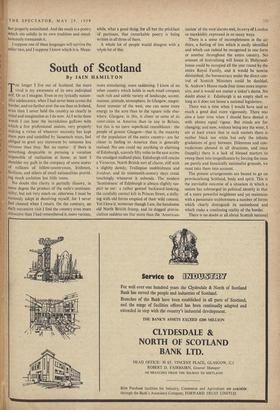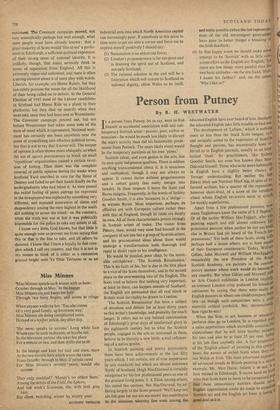South of -Scotland
By IAIN HAMILTON
r tic longer I live out of Scotland, the more vivid is my awareness of its own individual 't self. Or so I imagine. Even in my lyrically nation- alist adolescence, when I had never been across the border, and no farther over the sea than to Ireland, even then I never held the country so clearly in mind and imagination as I do now. As I write these words I can hear the incredulous guffaws with Which a few professional zealots, very properly laking a virtue of whatever necessity has kept them pure and undefiled by Sassenach ways, feel obliged to greet any statement by someone less virtuous than they. But no matter : if there is amething despicable in pursuing a vocation impossible of realisation at home, at least I shoulder my guilt in the company of some scores of millions of fellow-countrymen, Irishmen, Sicilians, and others of small nationalities provid- ing much ambition but little room.
No doubt this clarity is partially illusory, in some degree the product of the exile's sentimen- tality; but not very much so; otherwise I must be curiously adept at deceiving myself, for I never feel cheated when I return. On the contrary, on each successive visit I find the country even more attractive than I had remembered it, more various, more stimulating; more saddening. I know of no other country which holds in such small compass such rich and subtle variety of landscape, accent, manner, attitude, atmosphere. In Glasgow, magni- ficent monster of the west, one can sense more energy to the acre than to the square mile else- where. Glasgow, in this, is closer to some of its sister-cities in America than to any in Britain, but this is no mere superficial resemblance : the people of greater Glasgow—that is, the majority of the population of the entire country—are far closer in feeling to America than is generally realised. No one could say anything so alarming of Edinburgh, scarcely fifty miles to the east across the smudged midland plain. Edinburgh still retains a Victorian, North British sort of charm, stiff with a slightly dowdy, Trollopian snobbishness and froideur, and its nineteenth-century stays creak touchingly whenever it unbends. The modern Scottishness' of Edinburgh is always slightly sus- pect to me : a rather genteel baakward-looking, the carefully correct kilt in Princes Street, a dally- ing with old forms emptied of their wild content. Yet I love it, westerner though I am, the handsome old North British frump, and its dogged provin- cialism saddens me (far more than the 'American- isation' of the west'alarms me), its envy of London so mawkishly expressed in so many ways.
There is a sense of incompleteness in the air there, a feeling of loss which is easily identified and which can indeed be recognised in one form or another throughout the entire country. No amount of festivalising will lessen it; Holyrood- house could be occupied all the year round by the entire Royal Family, and it would be nowise diminished; the bureaucracy under the direct con- trol of Scottish Ministers could be doubled, St. Andrew's House made four times more impres- sive, and it would not matter a tinker's damn. No doubt about it : Edinburgh is an empty shell so long as it does not house a national legislature.
There was a time when I would have said as much a good deal more vigorously. There was also a later time when I should have denied it with almost equal vigour. But minds are for changing; and now, without being any the wiser, I am at least aware that in such matters there is neither black nor white but only the infinite gradations of grey between. Dilemmas and con- tradictions abound in all directions, and since (happily) there is a lack of blessed martyrs to sweep them into insignificance by forcing the issue on purely and fanatically nationalist grounds, we must take them into account.
The present arrangements are bound to go on provincialising Scotland, body and spirit. This is the inevitable outcome of a situation in which a nation has submerged its political identity in that of a more powerful neighbour and yet maintains with a passionate stubbornness a number of forms which clearly distinguish its nationhood and which make a continuing reality of the border.
There is no doubt at all about Scottish national sentiment. The Covenant campaign proved, not very scientifically perhaps but well enough, what most people must have already known: that a great majority of Scots would 'like to see' a parlia- ment in Edinburgh, a sufficient political expression of their strong sense of national identity. It is unlikely, though, that many seriously think in terms of separation from England. All this is extremely vague and unformed, and there is often a strong element about it of mere play with words. Liberals, for example, are Home Rulers, but they can safely promise the moon for all the likelihood of their being called on to deliver. In the General Election of 1945 most of the Labour candidates in Scotland had Home Rule as a plank in their platforms, but they shut up smartly when they were told, once they had been sent to Westminster. The Covenant campaign petered out, but not before Westminster had taken some note of the state of mind which it represented. National senti- ment has certainly not been anywhere near the point of crystallising into effective political terms, but that is not to say that it never will. The temper of opinion is often shown more obliquely, as when the use of agents provocateurs to break up small 'republican' organisations caused a certain revul- sion of feeling. Then there was the complete reversal of public opinion during the weeks when Scotland Yard searched in vain for the Stone of Destiny and failed to get their hands finally on the undergraduates who had taken it. As time passed the initial feeling of pious outrage (as expressed in the newspapers) was replaced by something very different, and repeated assurances of alarm and despondency among the very highest in the south did nothing to arrest the trend : on the contrary, when the truth was out at laSt it was politically impossible for the police to take any action at alL I know very little, God knows, but that little is quite enough now to prevent me from saying that this or that is the line to take, and all others be damned. I know that I have a loyalty to that com- plex which I call my country, and that it is not in my nature to think of it either as a recreation ground bright with Ye Olde Tartanne or as an
industrial area into which North American capital can increasingly pour. If somebody at this point in time were to get me into a corner and force me to express myself positively I should say : (1) Nationalism is an abhorrent force; (2) London's preponderance is far too great and is draining the spirit out of Scotland, and not only Scotland; (3) The rational solution in the end will be a federation which will restore to Scotland its national dignity, allow Wales to be itself, and make possible (when the last representa- tives of the old intransigent generations have gone to better things) a breaking of the Irish deadlock;
(4) In that happy event we should make some attempt to be 'Scottish' with as little con- scious effort as the English are 'English,' for there are few things more painful than the two basic attitudes—on the one hand, 'Him; I kcnnt his faither!' and, on the other, 'Wha's like us?'















































 Previous page
Previous page